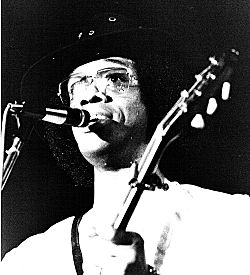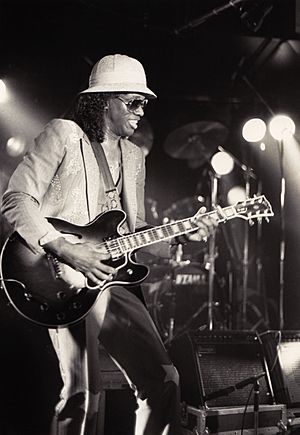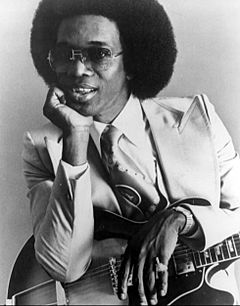Johnny "Guitar" Watson facts for kids
Quick facts for kids
Johnny "Guitar" Watson
|
|
|---|---|

Watson in 1976
|
|
| Background information | |
| Birth name | John Watson Jr. |
| Also known as | Young John Watson |
| Born | February 3, 1935 Houston, Texas, U.S. |
| Died | May 17, 1996 (aged 61) Yokohama, Japan |
| Genres | |
| Instruments |
|
| Years active | 1952–1996 |
| Labels |
|
| Associated acts |
|
John Watson Jr. (born February 3, 1935 – died May 17, 1996) was an American musician. He was famous as Johnny "Guitar" Watson. He was a singer, songwriter, and amazing electric guitarist. His music career lasted 40 years. He played rhythm and blues, funk, and soul music. His biggest hit song was "A Real Mother for Ya" in 1977.
Contents
Early Life and Music Beginnings
Johnny Watson was born in Houston, Texas. His dad, John Sr., played the piano. He taught Johnny how to play too. But Johnny loved the sound of the guitar even more. He especially liked the electric guitar. He admired players like T-Bone Walker and Clarence "Gatemouth" Brown.
His grandfather was a preacher and also played music. He played guitar and sang in church. When Johnny was 11, his grandfather offered him a guitar. But there was one rule: Johnny could not play "devil's music."
In 1950, when Johnny was 15, his parents separated. His mom moved to Los Angeles, and Johnny went with her.
Starting a Career in Music
In Los Angeles, Johnny won many local talent shows. This helped him get jobs with bands. He played with jump blues bands like Chuck Higgins's Mellotones. He also played with Amos Milburn. Johnny sang, played piano, and played guitar.
He quickly became well-known on the West Coast. He first recorded music for Federal Records in 1952. At first, he was called Young John Watson. In 1954, he watched the movie Johnny Guitar. That's when he got his famous stage name.
In 1953, Johnny Watson played with Shorty Rogers' Orchestra. They performed at the famous Cavalcade of Jazz concert. This concert was held at Wrigley Field in Los Angeles. Other famous musicians like Nat King Cole and Louis Armstrong also played there.
Johnny Watson was a flashy performer. He loved wearing fancy clothes. He put on wild shows on stage. He played the guitar very hard, without a plectrum (guitar pick). He often had to change his guitar strings during a show. He said he "stressified on them" too much.
His 1954 song "Space Guitar" was one of his first recordings. It showed his wild and unique electric guitar style. Many guitarists later looked up to Johnny Watson. His song "Gangster of Love" was first released in 1957. It became a big hit when he re-recorded it in 1978. It is now his most famous song.
He toured and recorded with his friend Larry Williams. He also played with Little Richard and Frank Zappa. In the 1960s, blues music became less popular. Soul music became more popular. So, Johnny Watson changed his style. He went from a southern blues singer to an urban soul singer. He started wearing gold teeth, big hats, flashy suits, and cool sunglasses.
He also changed his music. His albums mixed funk and blues. His 1980 album was called Love Jones. A music critic named Robert Christgau reviewed his 1977 album A Real Mother for Ya. He said Johnny Watson made "easy-listening funk" music. He praised the album's fun dance music and clever lyrics.
Later Career and Recognition
In the 1980s, Johnny Watson faced some personal challenges. His friend Larry Williams died in 1980. These events made him step away from music for a short time. He told The New York Times that he "got caught up with the wrong people."
His album Bow Wow came out in 1994. It brought him more fame than ever before. The album was even nominated for a Grammy Award.
In 1995, he received a Pioneer Award from the Rhythm and Blues Foundation. This was a special honor for his long music career. In February 1995, he talked about his musical influences. He mentioned Guitar Slim, Jimi Hendrix, and Stevie Ray Vaughan. He also played on Bo Diddley's 1996 album A Man Amongst Men.
Susan Maier Watson, who later became his wife, said: "Johnny always knew what was happening around him." She added that he was proud he could change with the times. He didn't get stuck in the past.
Death
On May 17, 1996, Johnny Watson was on tour in Yokohama, Japan. He collapsed on stage and died from a heart attack. His body was brought back to California. He was buried at Forest Lawn Memorial Park Cemetery.
Influence on Other Musicians

Johnny Watson's music inspired many other artists.
Frank Zappa said that Watson's 1956 song "Three Hours Past Midnight" made him want to become a guitarist. Watson also played on several of Zappa's albums. Zappa even called "Three Hours Past Midnight" his favorite record.
Steve Miller recorded "Gangster of Love" for his 1968 album Sailor. He also mentioned the song in his hits "Space Cowboy" and "The Joker".
Jimmie Vaughan, who is Stevie Ray Vaughan's brother, said that he and Stevie looked up to Johnny Watson. They thought he was one of the best guitarists, along with Freddie King, Albert King, and B.B. King. Watson also influenced Jimi Hendrix, Sly Stone, and Etta James.
Bobby Womack called Watson "the most dangerous gunslinger out there" in music.
Etta James said that Johnny Watson was one of her favorite singers. She met him when they were teenagers. She said her singing style was inspired by his. She called him "the baddest and the best." She also said he was a "master musician" who could create amazing melodies and grooves.
Albums
- 1963 Johnny Guitar Watson
- 1963 I Cried for You
- 1965 The Blues Soul of Johnny Guitar Watson
- 1973 Listen
- 1975 I Don't Want to Be Alone, Stranger
- 1976 Ain't That a ...
- 1977 A Real Mother for Ya
- 1977 Funk Beyond the Call of Duty
- 1978 Giant
- 1980 Love Jones
- 1984 Strike on Computers
- 1986 3 Hours Past Midnight
- 1992 Gonna Hit That Highway: The Complete RPM Recordings
- 1994 Bow Wow
- 1999 The Very Best of Johnny "Guitar" Watson
Charting Singles
| Year | Single | US label & no. |
Chart Positions | ||
|---|---|---|---|---|---|
| US Pop | US R&B |
UK | |||
| 1955 | "Those Lonely, Lonely Nights" | RPM 436 | – | 10 | – |
| 1962 | "Cuttin' In" | King 5579 | – | 6 | – |
| 1967 | "Mercy, Mercy, Mercy" Larry Williams & Johnny Watson |
Okeh 7274 | 96 | 23 | – |
| 1968 | "Nobody" Larry Williams & Johnny Watson with The Kaleidoscope |
Okeh 7300 | – | 40 | – |
| 1974 | "Like I'm Not Your Man" | Fantasy 721 | – | 67 | – |
| 1975 | "I Don't Want to Be a Lone Ranger" | Fantasy 739 | 99 | 28 | – |
| "It's Too Late" | Fantasy 752 | – | 76 | – | |
| 1976 | "I Need It" | DJM 1013 | 101 | 40 | 35 |
| "Superman Lover" | DJM 1019 | 101 | 19 | – | |
| 1977 | "A Real Mother for Ya" | DJM 1024 | 41 | 5 | 44 |
| "Lover Jones" | DJM 1029 | – | 34 | – | |
| 1978 | "Love That Will Not Die" | DJM 1034 | – | 59 | – |
| "Gangster of Love" | DJM 1101 | – | 32 | – | |
| 1979 | "What the Hell Is This?" | DJM 1106 | – | 83 | – |
| 1980 | "Love Jones" | DJM 1304 | – | 28 | – |
| "Telephone Bill" | DJM 1305 | – | 45 | – | |
| 1982 | "The Planet Funk" | A&M 2383 | – | 62 | – |
| 1984 | "Strike on Computers" | Valley Vue 769 | – | 77 | – |
| 1994 | "Bow Wow" | Wilma 72515 | – | 89 | – |
| 1995 | "Hook Me Up" | Wilma 72533 | – | 48 | – |
See also
 In Spanish: Johnny "Guitar" Watson para niños
In Spanish: Johnny "Guitar" Watson para niños
 | Valerie Thomas |
 | Frederick McKinley Jones |
 | George Edward Alcorn Jr. |
 | Thomas Mensah |


